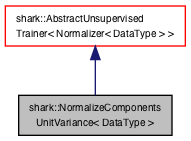Train a linear model to normalize the components of a dataset to unit variance, and optionally to zero mean. More...
#include <shark/Algorithms/Trainers/NormalizeComponentsUnitVariance.h>
 Inheritance diagram for shark::NormalizeComponentsUnitVariance< DataType >:
Inheritance diagram for shark::NormalizeComponentsUnitVariance< DataType >:Public Member Functions | |
| NormalizeComponentsUnitVariance (bool zeroMean) | |
| Constructor. More... | |
| std::string | name () const |
| From INameable: return the class name. More... | |
| void | train (Normalizer< DataType > &model, UnlabeledData< DataType > const &input) |
 Public Member Functions inherited from shark::AbstractUnsupervisedTrainer< Normalizer< DataType > > Public Member Functions inherited from shark::AbstractUnsupervisedTrainer< Normalizer< DataType > > | |
| virtual void | train (ModelType &model, const UnlabeledData< InputType > &inputset)=0 |
| Core of the Trainer interface. More... | |
 Public Member Functions inherited from shark::INameable Public Member Functions inherited from shark::INameable | |
| virtual | ~INameable () |
 Public Member Functions inherited from shark::ISerializable Public Member Functions inherited from shark::ISerializable | |
| virtual | ~ISerializable () |
| Virtual d'tor. More... | |
| virtual void | read (InArchive &archive) |
| Read the component from the supplied archive. More... | |
| virtual void | write (OutArchive &archive) const |
| Write the component to the supplied archive. More... | |
| void | load (InArchive &archive, unsigned int version) |
| Versioned loading of components, calls read(...). More... | |
| void | save (OutArchive &archive, unsigned int version) const |
| Versioned storing of components, calls write(...). More... | |
| BOOST_SERIALIZATION_SPLIT_MEMBER () | |
Protected Attributes | |
| bool | m_zeroMean |
Additional Inherited Members | |
 Public Types inherited from shark::AbstractUnsupervisedTrainer< Normalizer< DataType > > Public Types inherited from shark::AbstractUnsupervisedTrainer< Normalizer< DataType > > | |
| typedef Normalizer< DataType > | ModelType |
| typedef Normalizer< DataType > ::InputType | InputType |
Detailed Description
template<class DataType = RealVector>
class shark::NormalizeComponentsUnitVariance< DataType >
Train a linear model to normalize the components of a dataset to unit variance, and optionally to zero mean.
- Normalizing the components of a dataset works via training a Normalizer model. This model is then applied to the dataset in order to perform the normalization. The same model can be applied to different datasets.
- The typical use case is that the Normalizer model is trained on the training data. Later, as "test" data comes in, the same model is used, of course without being recalibrated. Thus, the model used for normalization must be independent of the dataset it was trained on.
- Note that subtracting the mean destroys sparsity. Therefore this feature is turned off by default. If you have non-sparse data and you need to move data to zero mean, not only to unit variance, then enable the flag zeroMean in the constructor.
Definition at line 74 of file NormalizeComponentsUnitVariance.h.
Constructor & Destructor Documentation
◆ NormalizeComponentsUnitVariance()
|
inline |
Constructor.
- The normalizer scales the data to unit variance. It can also remove the mean of the data. This is usually desired, e.g., for neural network training. Note however that this feature is sometimes undesirable since it can destroy sparsity.
- Parameters
-
zeroMean enable or disable data mean removal
Definition at line 89 of file NormalizeComponentsUnitVariance.h.
Member Function Documentation
◆ name()
|
inlinevirtual |
From INameable: return the class name.
Reimplemented from shark::INameable.
Definition at line 93 of file NormalizeComponentsUnitVariance.h.
◆ train()
|
inline |
Definition at line 96 of file NormalizeComponentsUnitVariance.h.
References shark::dataDimension(), shark::NormalizeComponentsUnitVariance< DataType >::m_zeroMean, shark::mean(), shark::meanvar(), shark::Data< InputT >::numberOfElements(), shark::Normalizer< VectorType >::setStructure(), SHARK_RUNTIME_CHECK, and shark::variance().
Referenced by main(), and run_one_trial().
Member Data Documentation
◆ m_zeroMean
|
protected |
Definition at line 129 of file NormalizeComponentsUnitVariance.h.
Referenced by shark::NormalizeComponentsUnitVariance< DataType >::train().
The documentation for this class was generated from the following file:
- include/shark/Algorithms/Trainers/NormalizeComponentsUnitVariance.h
